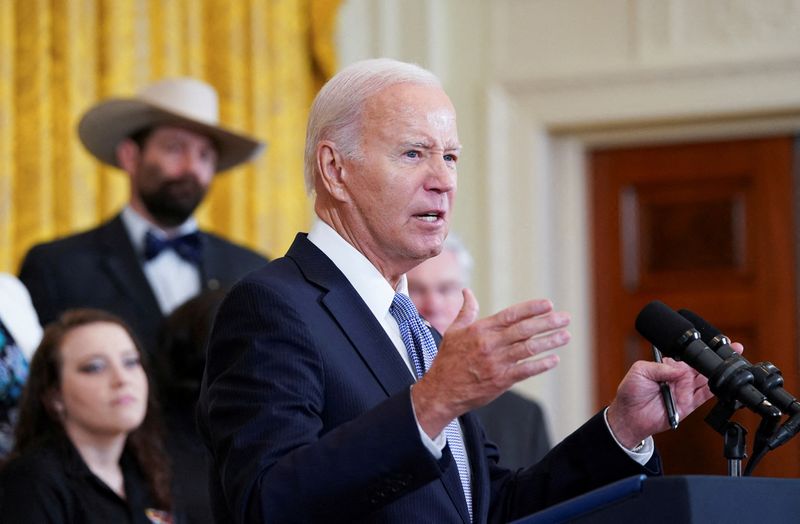By Leah Douglas
WASHINGTON (Reuters) -An effort by Republican U.S. lawmakers to reallocate $18 billion in climate-friendly agriculture funding under President Joe Biden’s signature climate law would shift money away from programs that primarily benefit farmers in Republican-leaning states, a Reuters analysis found.
The Inflation Reduction Act money, earmarked for U.S. Department of Agriculture-designated “climate-smart” farm practices, is intended to support Biden’s agriculture climate agenda, which relies heavily on storing carbon in the soil and lowering emissions through sustainable farming techniques.
About 65% of the new money due to be spent under the law on those climate-friendly practices would go to farmers in states that backed Republican former President Donald Trump in the 2020 election, and about 70% would go to states with a Republican member on the House or Senate farm committees, according to a Reuters examination of projections by University of Illinois agricultural policy professor Jonathan Coppess.
Iowa stands to get the most money with $1.03 billion, followed by Texas ($772 million) and Arkansas ($723 million), according to the projections by Coppess, which used historical USDA funding data to estimate how the Inflation Reduction Act money would be distributed.
Republican House of Representatives Agriculture Committee Chairman Glenn “GT” Thompson and the Senate Agriculture Committee’s top Republican, John Boozman, want to reallocate the Inflation Reduction Act money to all conservation programs without the climate-related requirements.
Under Thompson’s plan, some money also would be moved to crop supports and other farm programs, a committee aide said.
A spokesperson for Thompson expressed skepticism toward Coppess’s findings and noted that he previously served as general counsel for the Senate Agriculture Committee under Democratic leadership.
Representatives for both Thompson and Boozman said reallocating the funds could allow money to reach more farmers.
Democrats are opposed to the reallocation.
“Moving this funding away from conservation with its intended purpose – addressing the climate crisis – is a non-starter for me and does not have the votes in the Senate or the House,” Democratic Senate Agriculture Committee Chairwoman Debbie Stabenow said in an email to Reuters.
White House officials also have pledged a fight to preserve the money for climate-friendly practices.
Though Democrats control the Senate and White House, the typically bipartisan process of negotiating the farm bill – a package passed every five years to fund commodity, conservation, and nutrition programs – often involves compromise.
The dispute over the Inflation Reduction Act money could further delay progress on the overdue bill. The farm bill that was passed in 2018 expired on Sept. 30, and was extended for one year in November’s spending deal.
The farm committees are still drafting their versions of the next bill.
The climate-friendly agriculture money would go to programs whose demand typically far exceeds their available funds.
For instance, the USDA in 2021 funded 29.9% of applications for its Environmental Quality Incentives Program, which funds practices that increase soil health, reduce erosion and mitigate drought, according to the department’s most recent data. That program received nearly $9 billion for Inflation Reduction Act climate-smart farming grants.
Agriculture generates about 10% of U.S. greenhouse gas emissions, from fertilizer application, livestock manure and tilling land for crops, according to the Environmental Protection Agency.
(Reporting by Leah Douglas; Editing by Will Dunham)
